Chilling in the Teflon City
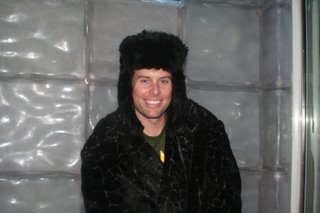 (Zero degrees celsius at the Russian Ice Bar in Lan Kwai Fong (the fur is fake, of course)).
(Zero degrees celsius at the Russian Ice Bar in Lan Kwai Fong (the fur is fake, of course)).They're all here: Rolls-Royce, Mercedes, BMW, Burberry, Bvlgari, Louis Vutton, Armani, Rolex, Gucci, Fendi, Zegna, Hermes, you name it, the list of who's who in the high end auto, accessory, perfume and fashion industry can be found lining the malls and sidewalks of Hong Kong. And for every store selling legitimate astronomically priced bling, there are a thousand small vendors selling you the real "fake" (except for autos) on every street corner (Note: On the day Mission Impossible III was released, I was offered a high quality DVD for $5 US). Hong Kong is a shopper's paradise, even more so than KL and Singapore. The malls are more orderly, more comprehensive of top designer names and easy to get to via public transport, taxi or limo. For the wealthy, the finest name brands of the world are at your fingertips.
And right behind the wealthy is a tremendously influential and influenced middle class, spending and maxing credit limits to keep up with the Jones, Zhangs and Wangs. When the British returned Hong Kong to China, the world wondered what would happen to the thriving port and financial center. Fear not, with a fifty year agreement in place where China deemed Hong Kong a special administrative zone (at least until 2047), China is not getting in front of the economic steamroller perched on its southern border. In fact, it appears that it is perhaps Hong Kong which may be pulling (or pushing) the rest of China toward a free market economy.
Fostering a mindset that "the poorer the better", Mao Zedong's "Cultural Revolution", left China in the dark ages until the mid-1970s after Mao died. Education was virtually non-existent and items such as jewelry, new clothes, and art were shunned. But Hong Kong was not subjected to Mao's influence, escaping the oppressive downward spiral of the revolution. After Mao's death, Deng Xiao Ping returned to power and Mao's revolution, already the source of famine and mass abject poverty was reversed as a new slogan, "to get rich is glorious", was subsituted in its stead. and thus, the awakening of a sleeping giant began.
China's history is checkered and marred by invaders from the East, West and North. It suffered (sometimes brutally) at the hands of the British, the Japanese and Mongols to name a few invaders. Understanding this history has provides insight into the Chinese psyche and the subsurface historical scars. Fears of "imperialist" aggressors, often identified today as the US, are tied closely to their 5,000 year history and not infrequent enslavement by occupying armies. The Chinese are proud of their heritage and the significant contributions derived therefrom, but are mindful of darker periods experiencing brutality at the hands of Genghis Khan (13th-14th centuries) and the brutal Japanese occupation of Manchuria in the 1930s.
With that backdrop in mind, China seems to like what Hong Kong has to offer and is perhaps even learning from it. On the efficient and clean MTR (metro), people move about the heavily populated metro area with ease. Most Hong Kongese are echno auditory addicts, incessantly globbing on to a cell phone, iPod or the latest PDA. Walking amongst the rush hour crowds, everyone is talking, but not to each other, to people elsewhere in the city, country and world. In fact, in China, it is rude not to answer your phone. Whether you're in the middle of a romantic dinner for two, catching a movie or god forbid, in the restroom, not answering your phone is poor etiquette. The electrified city is always on, and so too must be its residents.
Hong Kong is sexy, with glitz, glamour and neon drawing in super models, fashion designers and artists from all over the world. It is hard not to find some appeal in the mecca of capitalism. And so it goes for the People's Republic. Equally susceptible to the lure of Hong Kong's high profile glam image, the nation of 1.20 billion people is following the city of slightly more than 6 million down the road to free market heaven. Whether being ruled by the British or the Chinese, Hong Kong has barely slowed to notice (hence my term "Teflon City").
On Monday, I met with another couchsurfing contact, Stephen, who gave me a tailored local itinerary for my time in town. That same day, I also met Charlie, the friend of a friend from home, working in HK for one month. The three of us went to dinner at a local restaurant, since Stephen was fluent in Cantonese and therefore, could read the menu and order for us.
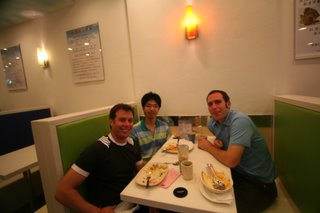 (Dinner with Charlie and Stephen.)
(Dinner with Charlie and Stephen.)Despite his fluency in Cantonese, Stephen was born and raised in NY and educated at the University of Texas. He moved to Hong Kong in 2000 with his mother and sister when his mother was diagnosed with cancer. While treatment in the US could have dwindled the family savings, Hong Kong residents receive excellent care that equates to about $9 US per day for hospital stays and less than $20 US for ER visits no matter what services are provided (Cat scan, x-rays, etc).
And the people in Hong Kong are going to need healthcare with their current lifestyle. Non-stop smoking and long hours at work lead to a fast paced lifestyle. The epicenter for multi-national corporations in Asia, expats and Hong Kongese alike are burning the wick at both ends. Competition is ever present in this appendage to China. Government regulation is comparatively minimal and the rule of law is closely heeded and enforced, attracting international corporations looking to break into the massive emerging Chinese middle class market, a task with more hurdles/barriers in mainland China.
Stephen invited me to visit Park Island where he tutors students in english a few days a week. He explained that Park Island was in transition as old fishing villages were being swapped for forty story condo buildings (dozens of them). Looking to break away from mainstream Hong Kong, I accepted his offer and took the ferry across Hong Kong harbor to the island.
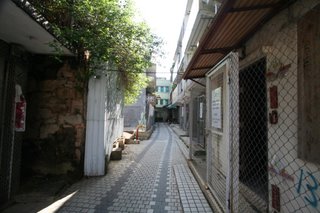 (Picture below: Ghostown fishing village waiting for the bulldozer.) No cars are permitted on the island (and there are no parking facilities), but for those who need to bring a car, the daily fees are steep. As an added bonus for island residents, they are permitted to keep dogs and cats, often not allowed in other areas of the city.
(Picture below: Ghostown fishing village waiting for the bulldozer.) No cars are permitted on the island (and there are no parking facilities), but for those who need to bring a car, the daily fees are steep. As an added bonus for island residents, they are permitted to keep dogs and cats, often not allowed in other areas of the city.Stepping off the ferry I was greeted by three sales agents working for the developer of the high rise condos. Since I had time to spare before Stephen was done with his first tutoring session, I embarked on an information gathering mission into the Hong Kong real estate market. While there were some communication issues (mostly b/c I didn't speak Cantonese), the agents did their best answering my questions about square footage, cost, financing and management fees. The biggest surprise was the seemingly too good to be true financing which I later confirmed with Stephen's interpretation. A buyer who puts five percent of the purchase price down today, would not have to make another mortgage payment for 2 years. That's right, no principal and no interest payment. Sound too good to be true? It may be, but a spin around the buildings suggested another alternative reason.
 (New condo units replace fishing village.)
(New condo units replace fishing village.)You can't breathe these days without hearing about the red hot Chinese economy. And the developer of these condos are betting that it will continue. But for now, Park Island might as well be Ghost Island as vacant units in the completed multi-phase project appear to far outnumber those inhabited. Compounding the developer's dilemma will no doubt be the fifteen additional forty-story buildings presently under construction.
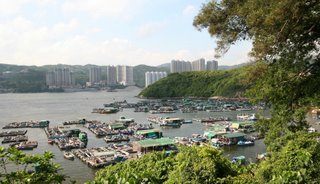 (Remainder of fishing village in the water with high rise replacements in the background.)
(Remainder of fishing village in the water with high rise replacements in the background.)The silver lining of Park Island development belongs to the villagers. In exchange for leaving their modest homes on the island, they were given three brand new units specially built for them (not to the high standard of the condos, but still pleasant). Effectively, this made most of the villagers millionaires (in Hong Kong dollars) overnight (that is a lot of fish). Many of them, and their families, will not have to work for the rest of their lives should they so choose. Chalk one up for the old man and the sea!
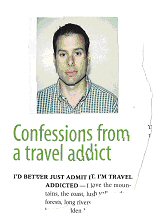

<< Home